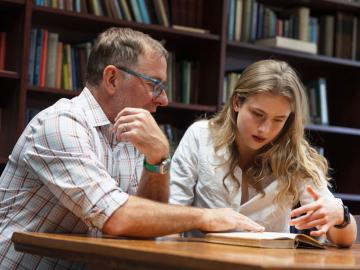Psychology Students Develop Technology to Help Adolescents Manage Chronic Pain
March 13, 2019
Erin Ulrich ’18

Professor and Chair of Psychology Nancy Darling and her students are developing 1step2life, a web-based app that helps adolescents manage chronic pain.
Darling's research team was awarded $20,000 for winning first place in the annual LaunchU Pitch Competition. The funding will be used to transform the current web-based app into an app that can be purchased and subscribed to from the iTunes App Store.
Chronic pain affects 20 percent of adults in the United States—nearly 50 million people—and poses tremendous challenges for those who suffer from it. Difficulties include completing daily tasks such as getting out of bed, showering, and walking. Living with chronic pain can be especially challenging for the 5 percent of children and adolescents in the United States who suffer from it. Pain can interfere with school, friendships, and everyday activities. Because most adolescents still live at home, chronic pain can cause immense strain for families as well.
Psychology major and computer science minor Max Kramer ’20 says that in Darling’s lab, he and his peers have studied how adults and adolescents differ in their responses to chronic pain.
“For adolescents, the proposition of doing something unpleasant now (such as giving up cheese or working out five times a week) for a potential decrease in pain months or years from now is unsavory at best,” he says. “Adolescents are more motivated by short-term rewards, which is a critical finding that 1step2life has integrated into the app’s educational materials.”
These findings are the rationale for the app’s reward system. Users—adolescents aged 13-22—are rewarded for every step they take toward functioning better, including getting out of bed, getting to sleep on time, or making it to school. Darling says that this feature not only helps kids take control of their own decision-making, but also allows parents to focus on what their children are doing, rather than on what they are not doing.
“Otherwise,” she says, “all you talk to your kid about is their pain. Instead it’s, ‘Oh, they got out of bed. They smiled.’ If you pay attention to those things, it really makes it easier.”
1step2life allows users to input their current behaviors and doctors’ recommendations into the 1step Planner, which uses the information to predict users’ functioning levels over a two-year period.
Users can also apply the tool to see how their pain levels would change over the same two-year period if they change their current behaviors. Such adjustments could include stress reduction, changing their diet, or exercising daily. These behavioral modifications can have immense long-term benefits.
Cinema studies and psychology double major Ava Dishian ’19 says that 1step2life’s approach is ideal because young people’s phones are already at their fingertips—literally. “People are in and out of doctors’ offices,” she says, “but your phone is always right there.” Dishian says that the app is also designed to provide support to people who cannot afford or access health care.

Photo by John Seyfried
1step2life not only allows adolescents to manage their health from the ease of their mobile devices, but the app also helps parents advocate for their children without dictating.
“All of the things that doctors want kids to do and parents have to make them do are exactly the kinds of things that kids believe their parents have no right to tell them to do,” Darling says. “I can tell my kid to go to school, but it’s considered wrong to tell them to meditate.”
Instead of parents lecturing their children on why they should follow their doctors’ advice, the app spells out the science behind pain and management techniques in language adolescents can understand, including an animated video explaining chronic pain. Per 1step2life’s motto, the app helps young people take back their lives on their own terms.
Several of Darling’s students have worked on 1step2life and the research behind it for more than two years and have even shifted the course of their academic and career trajectories because of their involvement in the project.
Kramer is pursuing an honors thesis focused on improving the app’s current model and implementing methods that will help the technology more accurately represent users' trends. He was also on the LaunchU team and says that the skills he has learned from the experience have been tremendous assets.
“Our mentor meetings were a fantastic resource to learn how to take our scientific background and apply it to the world of business,” Kramer says. “The lessons in pitching, marketing, and networking helped us transition from a lab into a business, and they provided new contacts that have since joined the project.”
Dishian, who produced the animated video explaining pain, is now exploring the prospect of a career in filmmaking for clinicians.
“It feels really good to be a part of something that can actually help people,” she says. “I feel like I’m contributing to society, and it’s satisfying to be able to be a part of something so big.”
Tags:
You may also like…
Oberlin Summer Research Institute Partners with Career Exploration and Development, Expands Capacity
January 17, 2025
For almost 20 years, Oberlin Summer Research Institute, or OSRI, has been fostering community and the development of Oberlin students. Now, beginning in summer 2025, the program will offer exciting new opportunities.
Ava Harvey ’26 Earns Leadership Alliance Summer Research Fellowship
August 8, 2024
Ava Harvey ’26 received a Summer Research Early Identification Program (SR-EIP) Fellowship from the Leadership Alliance.
Freya Kailing ’25 Named 2024 Goldwater Scholar
August 7, 2024
Freya Kailing ’25, a biology major from Kalamazoo, Michigan, received a 2024 Goldwater Scholarship, a prestigious award for college students planning research careers.


